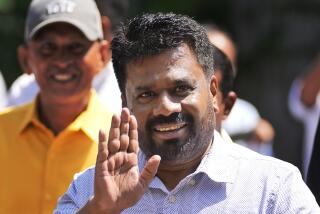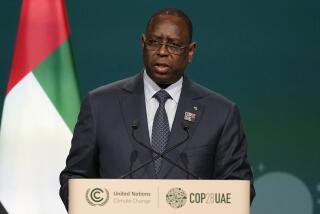Parliament Dissolved, Vote Called in Sri Lanka
- Share via
COLOMBO, Sri Lanka — President Junius R. Jayewardene, yielding to public clamor, announced Saturday the dissolution of Parliament and set Feb. 15 for Sri Lanka’s first general elections in more than a decade.
In a television and radio address, Jayewardene also made it clear that after a separate presidential election on Dec. 19, he will retire after 45 years in politics, including 11 years as ruler of this Indian Ocean island nation.
Jayewardene, 82, said the dissolution of Parliament will take effect Dec. 20, the day after the presidential election. But in an apparent rebuff to opposition demands, he said there is no need to hold parliamentary elections at the same time as the presidential poll.
“I feel that an opportunity should be given to the people to elect a new Parliament so that the new president should have the benefit of the views of the present electorate,” he said.
General elections, last held in 1977, were not due until next August.
Jayewardene’s move for early elections was seen by political analysts as an attempt to defuse the widest unrest Sri Lanka has seen since its independence from Britain in 1948.
Opposition demands for Parliament’s dissolution have snowballed among wide sections of Sri Lankan society over the last two months as a strike crippled civil administration, business and agriculture.
The Marxist People’s Liberation Front, drawn mostly from the majority Sinhalese community, wants to scrap an Indian-Sri Lankan pact signed by Jayewardene last year aimed at ending a revolt by minority Tamils.
Jayewardene said the Tamil conflict had abated in the north and east after the agreement, but he said terrorism in the south had begun to grow and that development in the nation had “suffered immeasurably.”
More to Read
Sign up for Essential California
The most important California stories and recommendations in your inbox every morning.
You may occasionally receive promotional content from the Los Angeles Times.










